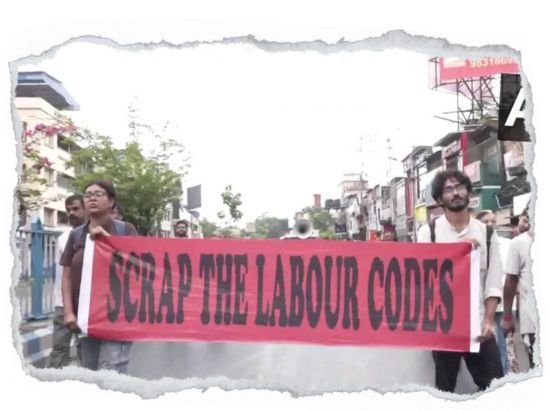
As the Bharat Bandh intensifies across the country today, protesters took to the streets in Kolkata, with several reports of arson attempts and large-scale demonstrations. The strike, backed by 10 central trade unions and supported by farmers’ groups, aims to oppose the Central Government’s labour and economic reforms, which unions claim are anti-worker and weaken long-standing protections.
In Kolkata’s Jadavpur area, demonstrators gathered near the 8B Bus Stand, prompting the deployment of heavy police force. Authorities reported that some left-affiliated trade union members tried to ignite fires during the protest. However, Kolkata Police responded swiftly, extinguishing the flames and preventing escalation.
The bandh has been called in support of 17 demands by workers, including the rollback of four controversial labour codes. With an estimated 250 million workers participating, sectors such as banking, insurance, postal services, coal mining, public transport, and construction have seen major disruptions.
Unions affiliated with All India Trade Union Congress (AITUC), NMDC, steel and mineral companies, and state departments are among the prominent participants. The Samyukt Kisan Morcha and various agricultural labour organizations have also joined the protest, marking a broad-based resistance against the government’s policy direction.
The Central Government, while asserting that many of the labour reforms have already been enacted by state governments, reiterated that it remains open to dialogue. Officials emphasized that any concerns should be resolved through discussion rather than disruption.
In Kolkata and other urban centers, security arrangements have been heightened. Buses—both private and government-run—are operating, but with caution. Drivers are reportedly wearing helmets to protect themselves against possible stone-pelting or violence during the bandh.
Kolkata Police confirmed attempts of fire-setting by protestors linked to leftist trade unions, though no major damage was reported. This has added to concerns about public safety, especially in politically sensitive zones. Additional security forces have been deployed in high-risk areas to maintain order.
While not uniformly observed across all states, the bandh is having a significant impact in regions with strong union presence, such as West Bengal, Kerala, Tamil Nadu, and parts of Maharashtra. Demonstrations have remained mostly peaceful but incidents of unrest like in Kolkata highlight growing tensions.
The protestors argue that despite repeated pleas, the government has failed to engage constructively with workers and address longstanding issues related to wages, job security, and privatization.